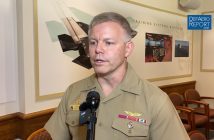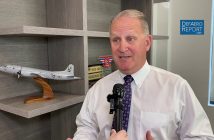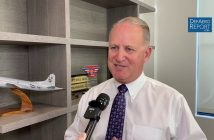Todd Tompkins, the program manager for international small combatants at the US Navy’s Naval Sea Systems Command, discusses the sale of Littoral Combat Ships to Saudi Arabia, international interest in both LCS versions and the worldwide small warship market with Defense & Aerospace Report Editor Vago Muradian. The interview was conducted at the Navy League’s 2019 Sea Air Space conference and tradeshow near Washington where our coverage was sponsored by GE Marine, Huntington Ingalls Industries and Leonardo DRS.
Vago Muradian: Welcome to the Defense and Aerospace Report. I’m Vago Muradian here at the Navy League’s Annual Sea Air Space Conference and Trade Show just outside Washington, DC, the number one gathering of U.S. Navy and indeed international Navies’ leaders from around the world to talk about technology, budgets, policy, strategy and more. Our coverage here is sponsored by GE Marine, Huntington Ingalls Industries and Leonardo DRS.
We’re here at the Naval Sea Systems Command site to talk to Todd Tompkins who is the Program Manager for International Surface Combatants, or PMS525 if I have that correctly, anybody who’s tracking along with NAVSEA codes. It’s a real pleasure.
Todd Tompkins: Thank you, sir. It’s a pleasure for me.
Mr. Muradian: Pretty much the Littoral Combat System is or the Littoral Combat Ship is the small surface combatant the United States has been trying to market overseas. Obviously some of our other surface combatants are a little bit large until they get used, in which case there is an opportunity to export them to allies and to friends.
The Saudi Arabia win on the Lockheed Martin variant of the LCS was big. I was joking with you. The other side of your card is in Arabic, and Barry McCullough, a retired United States Navy Vice Admiral, but also the Lockheed Martin point man for LCS International. When you guys got that deal signed it was certainly a reward for a lot of tenacity over many, many years. So talk to us a little bit about what the status of the program is as it moves through the pipeline, and then sort of, I’d like to sort of bridge that into who’s next? Somebody had to go first and the door is then open. But first, give us an update on where we are on the Saudi program.
Mr. Tompkins: Absolutely.
In 2017 is when the case started, the Saudis signed the case and funded the case. That’s when we initiated the development of the design of what we’re now calling the Multi-Mission Surface Combatant based on the Freedom variant LCS. We’re completing that design at present. We’ll start construction at the end of the calendar year 2019. We’re looking forward to building four of those ships across the next six years, but not just ships. There’s ordnance, shipload of all the ships, there’s training of crew and maintainer personnel from Saudi Arabia. There’s building infrastructure in Saudi Arabia and sparing and testing as well as part of the case.
Mr. Muradian: The first ship delivery is, walk us through what the delivery schedule is going to look like for all four of the ships.
Mr. Tompkins: The first ship starts construction at the end of this fiscal year. It’s a three-ish year sequence to build those ships. All the ships then are in series after that through 2025. And with each of those ships we’re training the crews for each of those ships, providing them with ordnance, et cetera, et cetera.
Mr. Muradian: And the program will be wrapped up roughly by when for all four of those ships? And also talk to us about options, because there is a discussion about whether or not it could go up to an eight ship buy.
Mr. Tompkins: Absolutely. 2025-2026 would be about the end of the effort, after the ship deliveries, the post deliveries, and getting them over in country.
There’s been some discussion, there was actually a Memorandum of Intent signed for four additional ships back in 2017. Not a lot of discussion of that lately, but it’s something we’d certainly be interested in, and I think something that would be good for the Royal Saudi Navy Forces.
We’re also looking at other customers. As you’ve said somebody had to go first. This was the first international sale of an LCS. That means something to us, as to what we think of as our product line and it’s attractiveness to international customers for a security cooperation agreement. So somebody will be next. It took us a long time to get this deal done with the Royal Saudi Naval Forces. We’re talking with a number of countries at present and we’re looking forward to having a deal with one of them as well.
We offer ships that are based on the Littoral Combat Ship, so they’re modular, reconfigurable ships. They can do a variety of different missions, and we keep developing systems to go onto those ships that can be available to a foreign customer. Or in the case of the Multi-Mission Surface Combatant for the Saudis, we permanently install those to the specific requirements of the country.
So we think we have a very adaptable product here that we’ve show with LCS and the multi-Mission Surface Combatant.
Mr. Muradian: Training. Talk to us a little bit about training, because the crews are training in the United States as you establish shore facilities and facilities over in Saudi Arabia. Talk to us a little bit about how you guys are training.
Mr. Tompkins: We’re training the Royal Saudi Naval Force’s crews like we’d train a U.S. crew. We’re bringing them to the United States. We get their English language proficiency up. We give them functional skills training. Then we train them on the LCS through courses the U.S. sailors would go through as well.
This is one of the things I think that made the case so attractive to the Saudis is they recognize the United States does good shipbuilding. We do good training. We do good logistics. They wanted all that on the case. So we have pipelines for all the officers, all the enlisted, for the maintainers as well. Moving those through courses across the United States. Then we’ll homeport the ships during post delivery in Mayport, Florida which is where we’ll have the crews as well, have a trainer down there off ship. Get them on their ship, get their ship ready to go, and get them sailed away to Saudi Arabia.
Mr. Muradian: And do they serve as a training cadre? Or do all the crews train here? Or do they go back home to the infrastructure you’re setting up in Saudi Arabia to train future crews?
Mr. Tompkins: For the first four crews, we’re going to train all of them in the United States. So they’ll all be here trained just like U.S. crews. All the crew with ship one will go with ship one; the crew with ship two, et cetera, et cetera. They certainly have the opportunity to train other Saudi folks back in Saudi Arabia.
Mr. Muradian: And do you expect any, there are concerns about Saudi Arabia, obviously, in the wake of the whole Khashoggi incident, and some pressure on the arms sale. Is there anything that stops this, given, I think the Saudis have already paid for or payments are in train now. Is there anything politically that could happen that would interfere with the deal?
Mr. Tompkins: An interesting way of wording the question. I don’t talk politics. I can say that the case has been congressionally notified and approved several years ago at this point, so we don’t see anything getting in the way of delivering the ships to the Saudis. Yes, the case has been funded. Yes, funds have started to flow. There’s a payment plan associated with that.
So no, I don’t see anything politically getting in the way of that.
Mr. Muradian: I’ve been covering the LCS program since it was born. Each year was going to be “the year of LCS” in terms of getting up on the deployment cycle. There are folks who are saying look, this is going to be the big year when the deployments really start to crank out. Do you think that’s going to help in your sales and marketing efforts? Because there’s still this sense that the ship is building up in piers, whether on the East Coast or on the West Coast, but they’re actually not in a standard deployment cycle at this point. How important do you think getting to that deployment cycle is to your efforts to get these ships into the hands, or to get more marketing interests or more sales interest in the platform?
Mr. Tompkins: More deployments is more better, if I can use that English here.
I’m a plank holder in the LCS program. I was with the program from the very beginning. I think it’s a quality ship. I stand behind it. But absolutely, the more the world gets to see the LCS and how that size class works particularly well for some nations, the more I think it will be of interest to international customers.
Mr. Muradian: And who do you see as your competition on this platform? As you look out there. Is it the German frigates, is it the French? Who do you see as your real competitor for it? Because it’s a little bit of a hybrid and it’s very much a hybrid in many cases.
Mr. Tompkins: Sure. In some cases a niche. All of those. And there are a number of European craft that could be viewed as competition. I don’t think of it as a competition. I work for the government. That’s not partly how we view the world. We have a product. If folks are interested in that product we’d be happy to have discussions with them.
Mr. Muradian: Any interest in the Austal version of the ship? Obviously there are two versions. They will be built in equal numbers. We’ll see, certainly for the first 26 of the 52 ship program. The remaining 26 will be in the Freedom variant although Austal and its partner, General Dynamics, is in there just as much as Lockheed Fincantieri are in there. Any interest in the Austal size ship? Because it’s always been a sense that Pacific powers, for example, might be a little bit more interested in that larger flight deck variant of the ship.
Mr. Tompkins: Yes, there’s been interest in both variants of the LCS. Each are children we love individually. They both have strengths and weaknesses to an international audience. Yes, there’s interest, and yes, we’d be happy to sell either of them. Both of them are modular, so reconfigurable to a customer’s needs. Both of them could have permanently installed equipment as well. I could see, as well, like you’re saying, some of the Pacific countries particularly well suited.
Mr. Muradian: Todd Tompkins, the Program Manager for international Surface Combatants at the Naval Sea Systems Command. Thanks very much, and best of luck.
How soon do you think you might be able to announce another buyer now that the first one is out? That’s my parting question.
Mr. Tompkins: FMS is hard. It took us about a decade to get to this point with the Saudis. So it is a difficult one to say. I would not want to place bets on that.
Mr. Muradian: Very good. We’ll just stay tuned until you have an announcement to make. Todd, thanks very much.
Mr. Tompkins: Thank you, sir.
30




